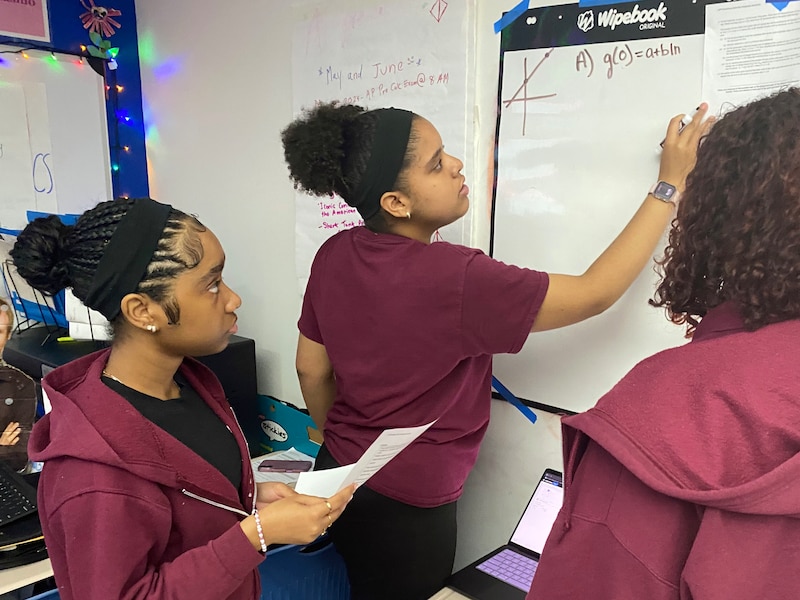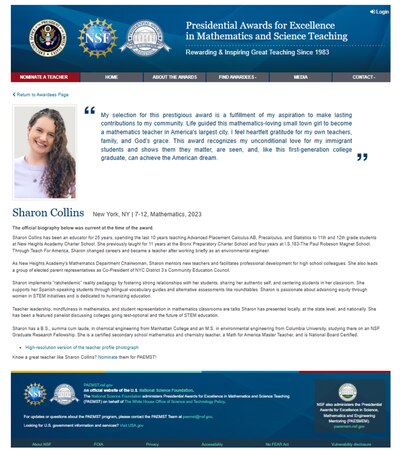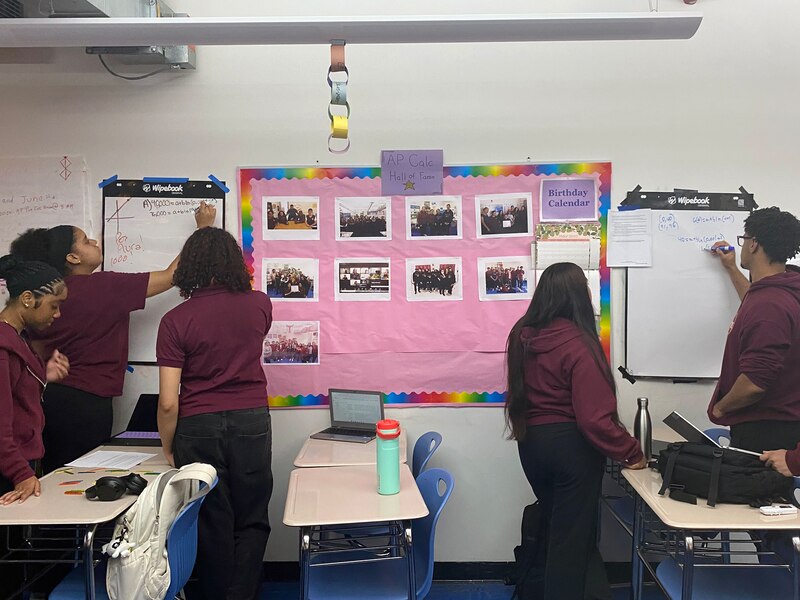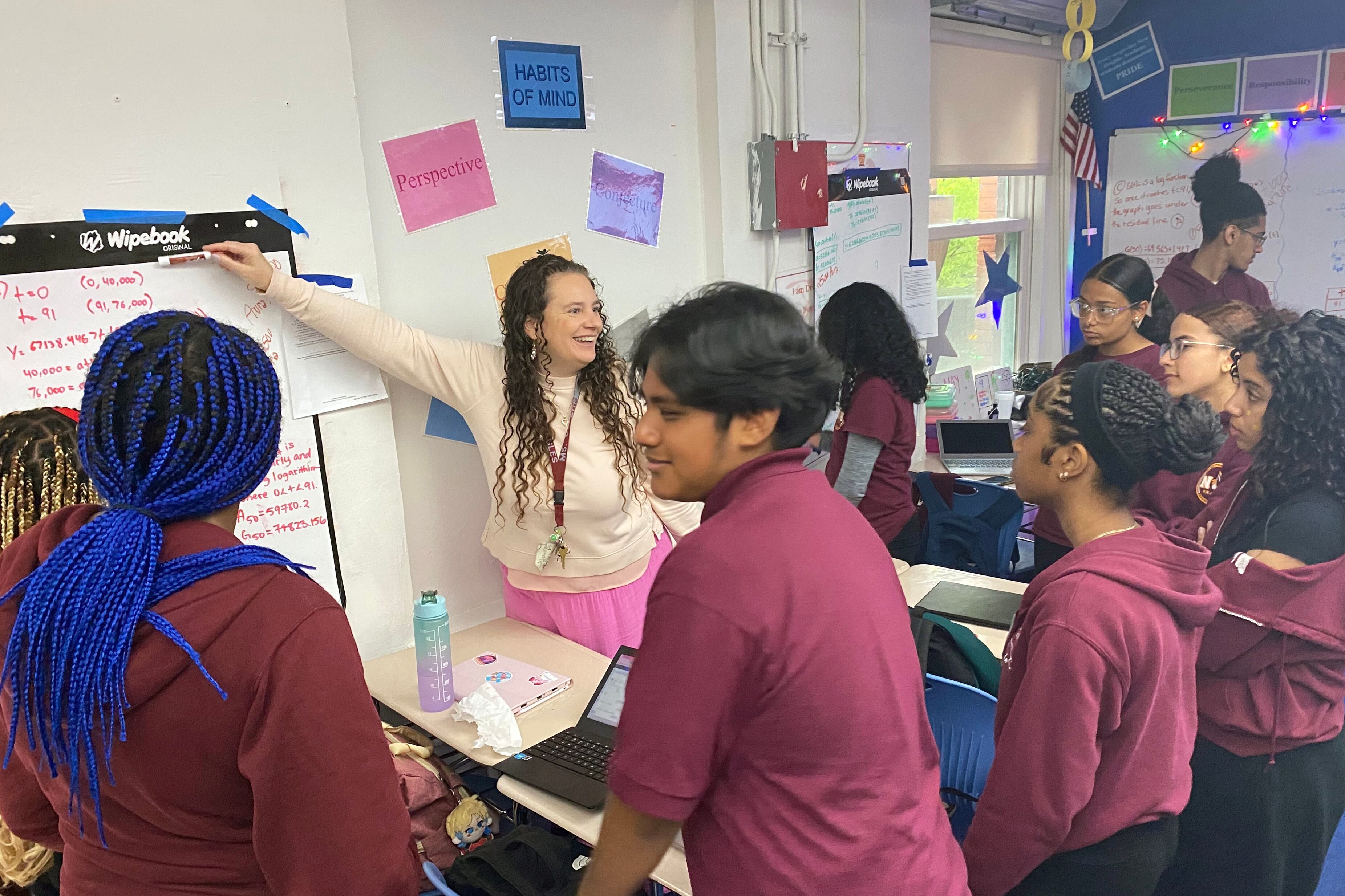Sign up for Chalkbeat New York’s free daily newsletter to get essential news about NYC’s public schools delivered to your inbox.
All 25 students in Sharon Collins’ Advanced Placement Calculus AB class focused intently on the problem she posted on the whiteboard at the front of the class, trying to figure out the rate of change for sales of a video game a few months after it was released.
In some ways, the juniors and seniors were forced to engage with their whole bodies: by standing up and doing the work in randomly selected groups of three or four at dry-erase sheets taped around the walls of the classroom at upper Manhattan’s New Heights Academy Charter School.
Though Collins has been teaching for 27 years, she’s constantly incorporating new approaches, such as having her students do problems standing at white boards, which she learned from Peter Liljedahl’s “Building Thinking Classrooms” model. She’s the kind of teacher who makes math fun even for the self-proclaimed math-phobic students. She sets high expectations for her students — and figures out how to help meet them, for instance, by supporting her Spanish-speaking students at the largely immigrant school through bilingual vocabulary guides and alternative assessments like roundtables.
Collins’ energy, enthusiasm, and dedication have not gone unnoticed: She was one of two teachers in the state selected in January by then-President Joseph Biden and the White House to win the 2023 Presidential Award for Excellence in Mathematics and Science Teaching, the nation’s highest honor for K-12 STEM teachers.
But she and the other teachers in each state to win January’s presidential award could be the last.
The initiative, created by Congress in 1983 and run by the National Science Foundation, has been cut by the Trump administration. Up to 110 winners a year get $10,000 for their school’s STEM programs through the award and an all-expense trip to Washington, D.C. for an awards ceremony. Last year, it had a total budget of about $4.5 million, including recognition events and coordinator meetings, according to people familiar with the program.
As the award’s loss reverberates among past awardees, many are mounting a campaign to save it, calling their state’s senators and representatives, members of the House Education Committee, Science Committee, and Appropriations Committee, as well as leaders at the White House Office of Science and Technology Policy.
At the first award ceremony 42 years ago, President Ronald Reagan said, "America’s future depends on excellence in education. And that means we must reward and encourage excellence in teaching."
Winning the recognition has had longstanding effects for many teachers, reverberating beyond their individual classrooms and creating a national community of educators committed to elevating STEM in their states. Some pursued doctorates in mathematics or math education and assumed leadership roles in their district or at the state level, giving them a larger say in curriculum issues, according to a survey conducted by a group of awardees. Others started national robotics programs or computer science initiatives. Many went on to conduct teacher training or presented at state conferences, sharing best practices with colleagues at other schools.
For Collins, the award gave her confidence to begin seeking out editors and agents for a teaching memoir she’s long been working on, and she’s considering a graduate degree to pursue her dream of opening her own STEAM-focused school.
“It changes your perspective on yourself to go for other opportunities,” Collins said, noting that after winning she put in two proposals to speak at math education conferences and she spoke at an alumni event for Teach for America. “I definitely want to influence the students in my room, but I do want to have a bigger impact in STEM education on a school level, on a state level, and even on a city level.”

Trump administration targeted DEI nods in winners’ bios
Collins had an inkling something might happen to the award program after President Donald Trump took office. His administration almost immediately took down the page with the awardees’ biographies and quotes. In her quote, Collins had written, “This award recognizes my unconditional love for my immigrant students and shows them they matter, are seen, and like this first generation college graduate, can achieve the American dream.”
In early May, the Trump administration eliminated the Division of Equity for Excellence in STEM along with other divisions at NSF. Collins, who was supposed to be on this year’s panel to select the 2025 winners received an email from NSF saying the panels had been canceled and thanking her for her service. The website for the program, however, remained live, and Collins held out hope that the program was just on pause.

The bios of the recent winners were reinstated in early June, Collins said, but with certain phrases or words omitted. For instance, Collins had written in her bio, “Sharon is passionate about advancing equity through women in STEM initiatives and is dedicated to humanizing education.” Collins told Chalkbeat this referred to her practice of taking female students to STEM programs like Woman STEM Night at the New York Hall of Science in Queens and forming a Female Equity Mission. When her bio was reposted, the line had been changed to: “Sharon is passionate about advancing fairness in STEM initiatives and is dedicated to humanizing education.”
Collins was flummoxed. “It astounds me that it is controversial to talk about women in STEM initiatives, since it is well documented that females are underrepresented in STEM,” she said.
A few days after the bios were back up, however, the program was officially eliminated from NSF’s budget for the upcoming fiscal year. The Trump administration reduced the NSF budget from $9.1 billion to $3.9 billion, zeroing out funding for the Excellence Programs along with other STEM research.
At the end of June, the awards program asked the most recent winners to update their bios, giving them a week to answer three questions, such as “Using your platform as a Presidential Awardee, how do you hope to advance our nation in STEM?” Those responses have yet to be posted.
NSF officials declined to comment.
The award’s immediate effect on New Heights Academy
A sign congratulating Collins on her award hangs proudly in New Heights Academy’s lobby, where students have long counted the math teacher among their favorites.
Rosalia Lacen, a recent grad who took Collins’ statistics class this past year and hopes to pursue a degree in biology, credited her teacher with keeping her “on track.”
“I’m not much of a math girl, in particular,” Lacen said. “But the way she teaches, she makes it easy to understand. … She brings a really good energy to the environment that just keeps you on track … Every morning, the same enthusiasm, even on her bad days.”

Collins’ award is having an immediate effect on sharpening her school’s STEM focus. Next year, she will oversee a new program for New Heights Academy’s middle and high school students, creating a robotics program for middle school and launching an AP Computer Science course for high school. (This past school year, the school only offered one non-AP computer science class, and it was reserved for top-performing seniors.)
“That conversation happened after my director found out I won the award,” Collins said. “It will have a huge impact on all of the students here.”
And other teachers felt like they were having a broader effect as well, she said.
“In the United States, to have engineers, to have people working in technology, to have doctors, we need a strong STEM education,” Collins said. “And that’s what’s being provided by these [presidential award] winners. They’re influencing their students to provide STEM education in high school and college, and they’re becoming our STEM workforce.”
Collins’ efforts seem to have paid off in her students’ scores. She learned this week that 90% of her AP Calculus students achieved a 4 or 5 on the AP Calculus AB exam. The class average was 4.36 compared to the state’s 3.15 average, Collins said. And 90% of students in that class plan to major in STEM in college, she added.
Correction: New Heights Academy Charter’s STEM program will have robotics for middle school, not high school. The school will also be offering AP Computer Science for the first time.
Amy Zimmer is the bureau chief for Chalkbeat New York. Contact Amy atazimmer@chalkbeat.org.







